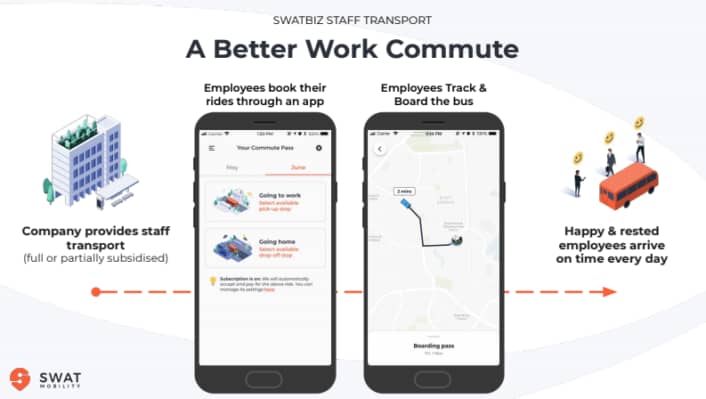Manila, Philippines – Ever since the coronavirus hit the greater civilians worldwide, every country had been caught dead in their tracks; no one had a master plan in hand, and for the longest time since the virus had been birthed, countries – its government bodies as well as businesses are making up their pandemic responses as they go along.
A strategy that has been resounding across nations is the restriction of transportation services to contain contact, and in the Philippines, the government vacillated since March in coding the nation along four different quarantine levels; albeit unique, all with a directive to halt public transportation.
APAC vehicle-routing tech SWAT Mobility pokes the Philippines during these strange times and seeks to present a solution to the nation’s transpo plight. Amid suspended mass transit systems and almost half to a hundred percent public utility vehicles disallowed, it has left the government imploring companies to implement shuttle services for their employees.
Just like a ride-hailing service, SWAT Mobility operates through a mobile app, but one where its services cater to a group-specific transpo pooling. In a virtual presser Aug. 19, Chief Revenue Officer Nicholas Stipp presents the two options, ‘Commute Pass” and “Just In Time” that companies can choose from to transit their workers.
For companies with staff that have stable shifts and predictable reporting times, “Commute Pass” offers a riding service where bookings are confirmed for the whole month with the same pick-up and drop-off location. “Just in Time” on the other hand, works well with types of companies whose employees have different reporting and knock-off times.

With “Just in Time,” passengers can book a ride up to 10 minutes before departure, where the system collates the bookings and generates optimized routes for the entire vehicle fleet within minutes.
This isn’t the first time that SWAT Mobility has looked into the Philippines as a possible market. Stipp said that around mid of 2019, the Singapore-headquartered company has already tagged the country as a top priority for expansion outside its HQ.
“I started coming [in the Philippines] about a year ago, but the question at that time was, how do we address commuting challenges under normal circumstances. As things have aggressed with COVID, we really accelerated our plans, so we planned to do a trial basis with [workspace solutions company] KMC, and see how things would go, and make sure everything is stabilized. But we have found that demand is just too strong, so we really scrambled in, and now we have multiple clients within a couple of months,” said Stipp.
Eventually, as the country eased to a more lenient community quarantine, and public transport has been gradually allowed to ply, Filipinos find themselves going back to point-to-point (P2P) buses as mode of transport, aside from the general public utility vehicles (PUVs). P2P buses are buses which have a predetermined single pick-up and drop-off points.
One of the pain points that SWAT Mobility vows to solve with their products is the aching process of arriving at the exact location of work, and thereafter reaching one’s place of home.
According to SWAT Mobility’s data, a person trying to get home from work via a P2P or PUV would get picked up from a common passenger point and be transported to a general drop-off that is still roughly four to five kilometers away from the person’s exact residential, incurring additional rides and more time spent on the road.
SWAT Mobility said that with their transport solutions, passengers are given a “close-to-door” service where vehicles await right outside employees’ workplaces, and each passenger transported to a drop-off point that would only need a person to travel a walking distance of a maximum 300 meters.
The company had first run a SWAT Mobility deployment for healthcare workers in Thailand in April, and has followed releasing the same mode of transport for workers of state-owned healthcare Philippine General Hospital (PGH).

As of current, PGH is utilizing SWAT Mobility’s “Just In Time” booking, where a 24-hour deployment is implemented with three shifts of round trips.
Aside from PGH, workspace solutions provider KMC has also tied up with SWAT Mobility to provide its employees with a Smart Staff Corporate Shuttle; a home-to-office and office-to-home transport for its 15 office sites which launched in July 2020.
Stipp said in a press statement that the company will continue working with the public and private sectors in the country to further alleviate the transportation burden off Filipino workers’ shoulders, and add resolve to the traffic problems that have always plagued the country.
He said, “SWAT Mobility’s core belief is that efficient transport is a fundamental right and with that, the company’s mission is to improve congestion as well as improve quality of life through a cloud mobility engine.”

